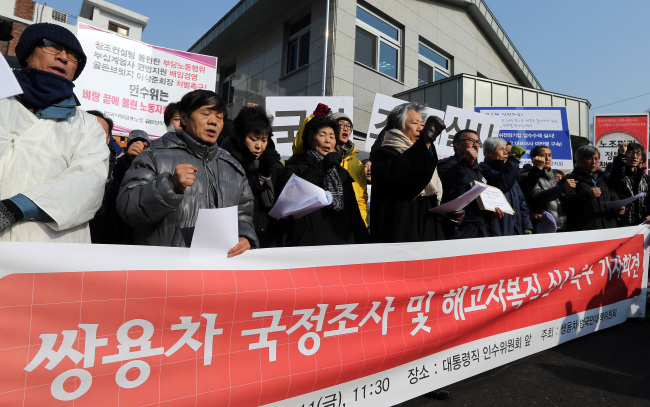쌍용 자동차 노사가 10일 무급휴직자 전원 복직에 합의함에 따라 2009년부터 기약 없는 휴직에 들어갔던 455명은 일터로 돌아가게 되었다.
이로서 노사는 지난 2009년 쌍용차가 인도 마힌드라 그룹에 인수되는 과정에서 2,646명의 대량 인원감축을 강행하면서 시작된 쌍용차 사태 해결을 향한 첫 걸음을 뗐다.
 |
11일 오후 서울 삼청동 대통령직 인수위원회 앞에서 열린 쌍용차 문제 국정조사 촉구 기자회견에서 참석자들이 구호를 외치고 있다. (연합뉴스) |
<관련 영문 기사>
Seeds of discord remain in Ssangyong despite reinstatement
By Seo Jee-yeon
Despite Ssangyong Motor’s Thursday agreement to reinstate 455 workers on unpaid leave from 2009, another labor dispute is looming large with the nation’s fifth-largest carmaker. Rising to the center of the brewing controversy is how to deal with those who voluntarily resigned or were fired during the restructuring process in 2009.
The carmaker didn’t include them in the list of reinstatement, but the labor circles, including the Korean Metal Workers Union, an umbrella group of Ssangyong Motor’s labor union, have urged the company to rehire them as they left the company due to what they claimed were the company’s wrongdoings.
A total of 1,904 workers left the company by applying for a voluntary leave program, while 159 were laid off in 2009 in the course of a structural adjustment to sell the company to Indian Mahindra Group.
Employment and Labor Minister Lee Chae-pil said in a radio interview on Friday that Ssangyong Motor has no responsibility to rehire workers who left the company voluntarily or who were fired in the restructuring process, unless corporate management is normalized.
Labor circles dismissed his remark on the issue as "careless," claiming that they had to leave the company as corporate management doctored the books to put the company at the brink of bankruptcy, which gave a reason for downsizing. In 2010, the company sold a majority stake to Indian-based Mahindra in 2010.
The Korean Metal Workers Union has urged political parties to launch a parliamentary inspection on what really happened when the company decided to cut personnel.
Sim Sang-jeung, a pro-labor lawmaker from the opposition Progressive Justice Party, also hosted a press conference on Friday to urge the government to inspect wrongdoings that Ssangyong Motor made in the course of cutting its workforce in 2009.
The company’s current workers, however, allegedly opposed the engagement of the political circle to the corporate issue, in concern for the negative impact on its recovering business. According to the company, its total vehicle sales rose 6.8 percent on-year in 2012 to 120,717 units. They have argued that their company’s image had been tarnished due to the involvement of political parties and labor circles in its in-house issues.
"All parties involved in the prolonged labor dispute at Ssangyong Motor were deeply hurt and what is needed the most now is to focus together on normalization of the company,’’ an official from the Korea Chamber of Commerce and Industry said.
Ssangyong Motor’s prolonged labor dispute has epitomized key issues faced by Korean workers, including mass layoffs and speculative foreign capital.
(jyseo@heraldcorp.com)







